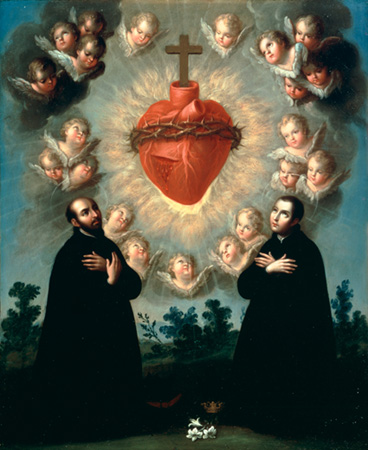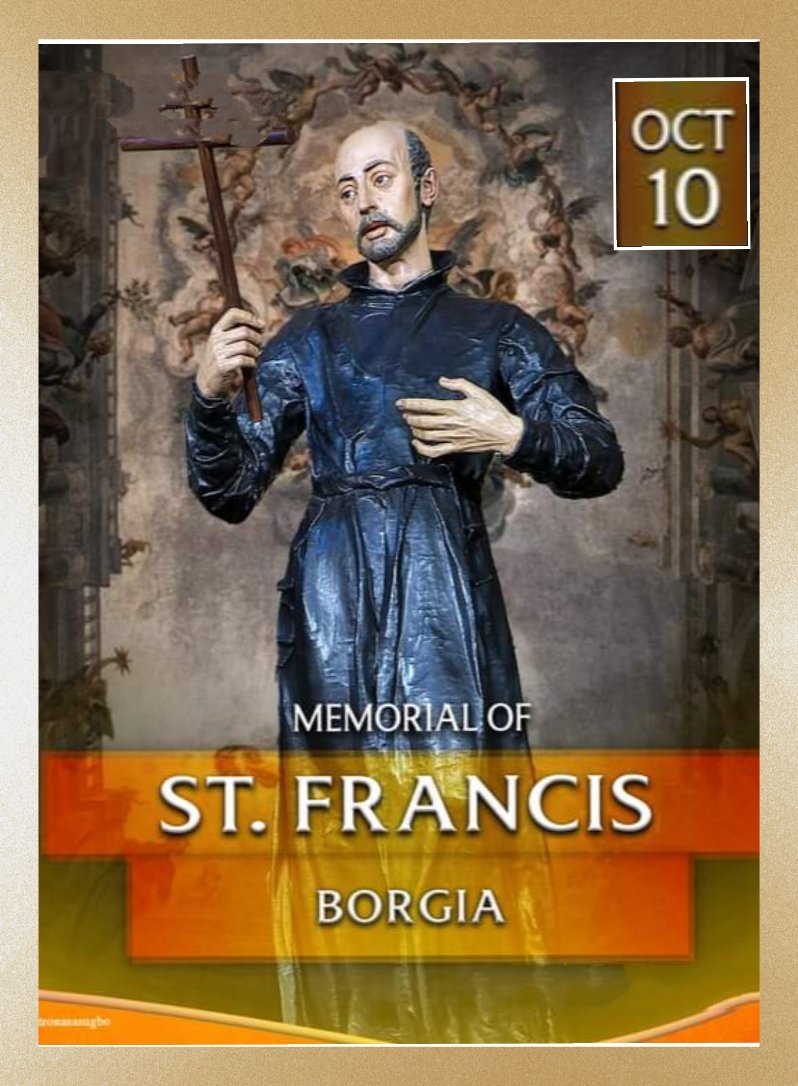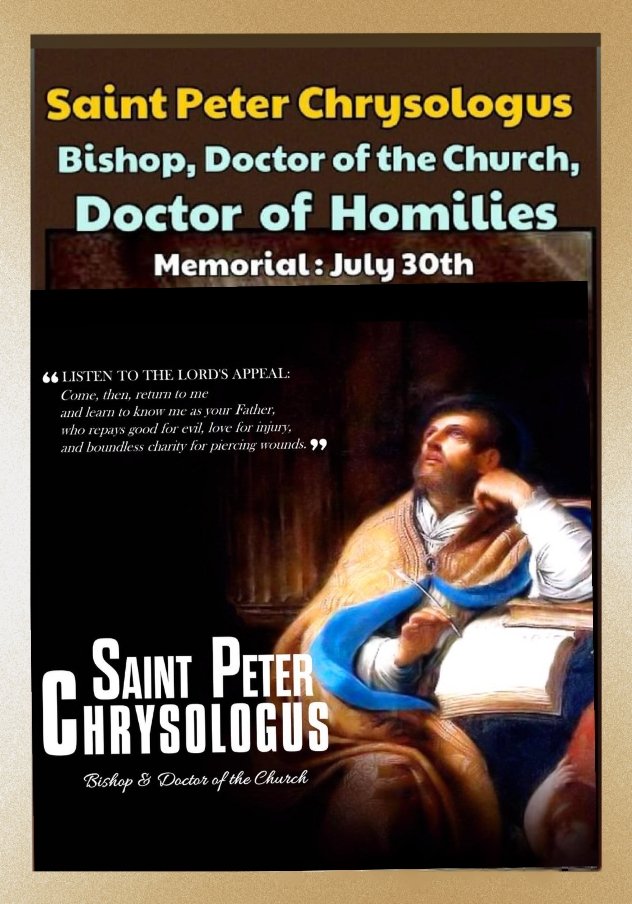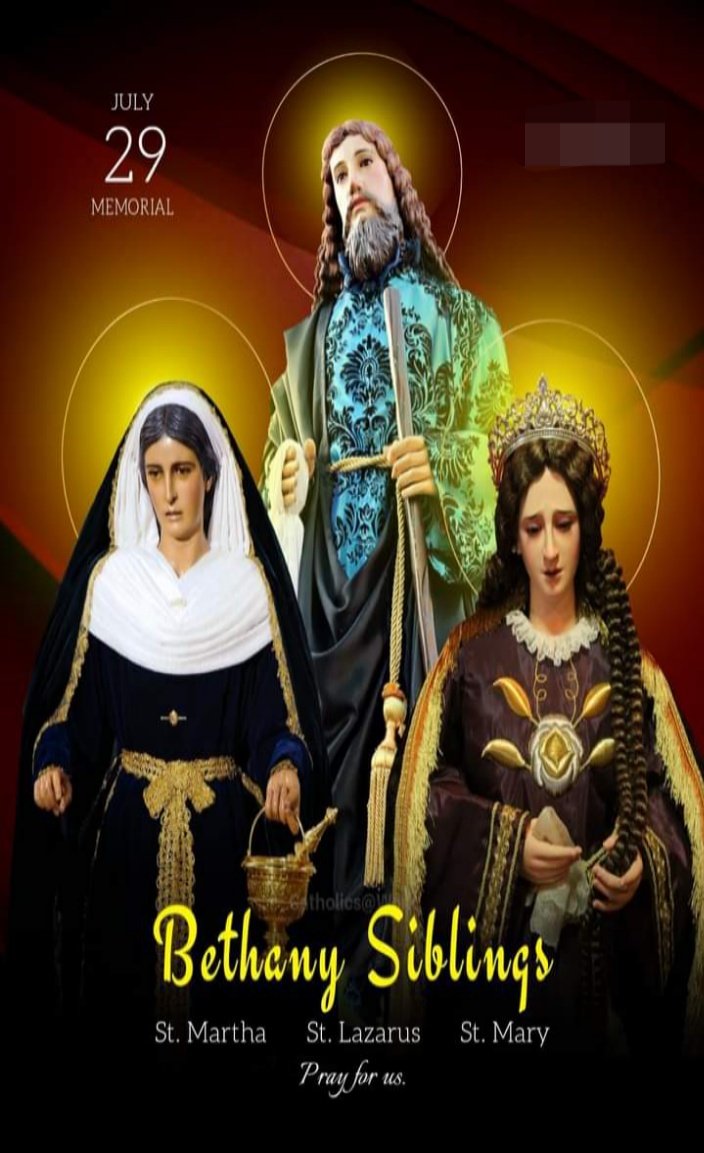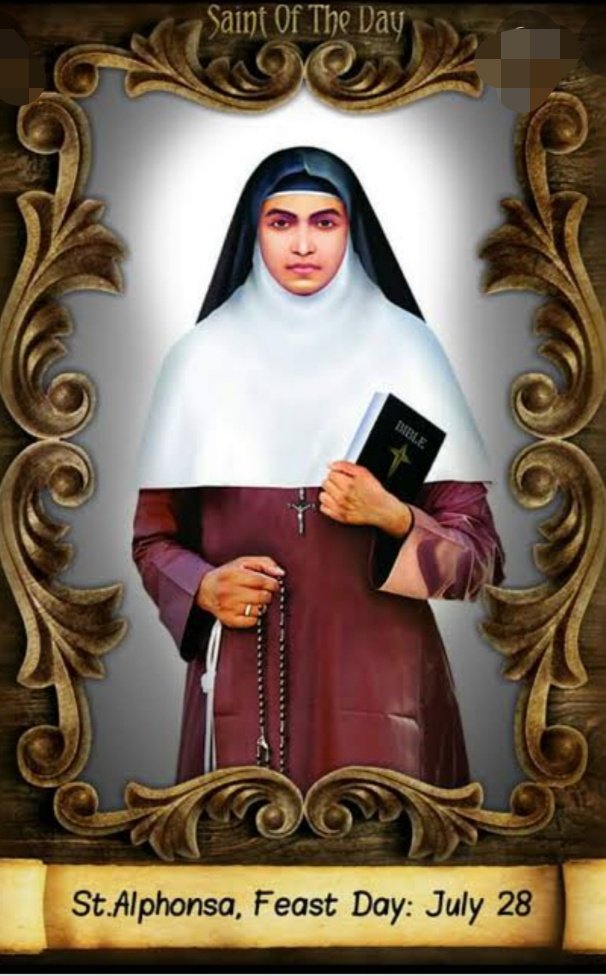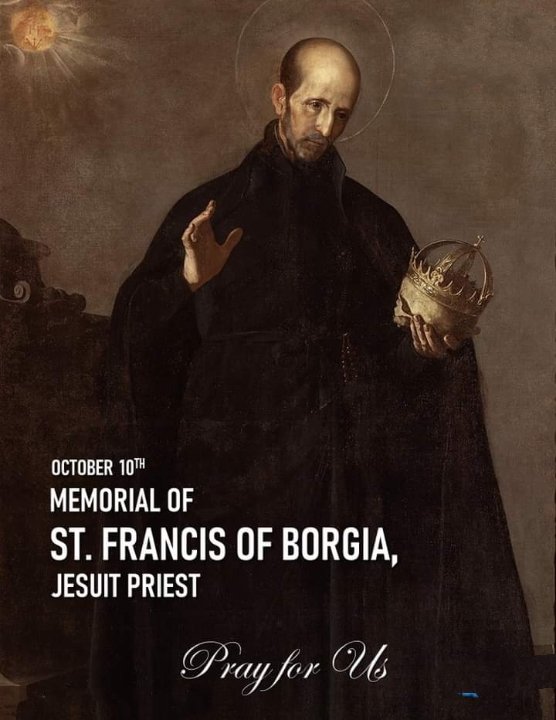
SAINT FRANCIS BORGIA, CONFESSOR
FEAST DAY – 10th OCTOBER
St. Francis Borgia, a bright example of virtue, both for ecclesiastics and laymen, was born in 1510, at Gandia, in Spain. His father was John Borgia, the third Duke of Gandia; and his mother, Joanna of Aragon, grand-daughter to Ferdinand the Catholic. Francis, when only a child, was already remarkable for his virtue and piety.
When scarcely seventeen years old, he came to the Court of Emperor Charles V, where, notwithstanding the many and great dangers to which he was exposed, he preserved his innocence by frequently partaking of the Blessed Sacrament, by great devotion to the Blessed Virgin, and the practice of mortification. His talents and his edifying life gained him the esteem of the Emperor.
Hence the Empress gave him in marriage to a very virtuous lady, who was a great favorite of hers. Francis was then made chief equerry to the Emperor, and created Marquis of Lombay. The court which Francis kept after he was married might have served as a model to all Christian princes.
He distributed the hours of the day, so that certain times were devoted to prayer, to business, and to recreation. He, at the same time, began the praiseworthy practice of selecting every month a Saint for especial veneration.
He was much opposed to gaming, and did not allow his servants to indulge in it. He used to say: “Gaming is accompanied by great losses; loss of money, loss of time, loss of devotion, and loss of conscience.” The same aversion he had for the reading of frivolous books, even if they were not immoral. He found his greatest delight in reading devout books, and said: “The reading of devout books is the first step towards a better life.”
At the period in which he lived the principal enjoyments of the higher classes were music and hawking; and, as he could not abstain from them entirely, he took care, at such times, to raise his thoughts to the Almighty, and to mortify himself. Thus, when he went hawking, he closed his eyes at the very moment when the hawk swooped; the sight of which, they say, was the chief pleasure of this kind of hunting.
The Almighty, to draw His servant entirely away from the world, sent him several severe maladies, which made him recognize the instability of all that is earthly. He became more fully aware of this after the death of the Empress, whose wondrous beauty was everywhere extolled. By the order of the Emperor, it became the duty of Francis to escort the remains to the royal vault at Granada.
There the coffin was opened before the burial took place, and the sight that greeted the beholders was most awful. Nothing was left of the beautiful Empress but a corpse, so disfigured, that all averted their eyes, whilst the odor it exhaled was so offensive that most of the spectators were driven away.
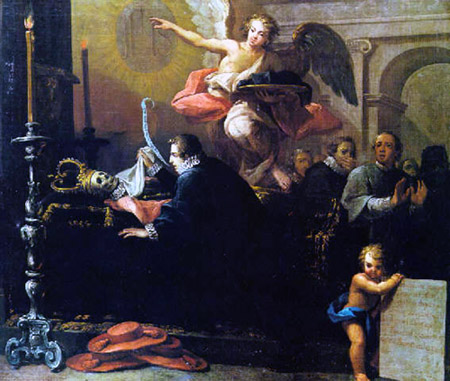
St. Francis was most deeply touched, and when, after the burial, he went into his room, prostrated himself before the crucifix, and having given vent to his feelings, he exclaimed: “No, no, my God! in future I will have no master whom death can take from me.” He then made a vow that he would enter a religious order, should he survive his consort. He often used to say afterwards: “The death of the Empress awakened me to life.”
When Francis returned from Granada the Emperor created him Viceroy of Catalonia, and in this new dignity the holy Duke continued to lead rather a religious than a worldly life. He had a fatherly care for his subjects, and every one had at all hours admittance to him. Towards the poor he manifested great kindness. He daily gave four or five hours to prayer. He fasted almost daily, and scourged himself to blood. He assisted at Mass, and received Holy Communion every day.

When he heard that disputes had arisen among the theologians at the universities, in regard to the frequent use of Holy Communion, he wrote to St. Ignatius, at Rome, and asked his opinion on the subject. St. Ignatius wrote back to him, approving of the frequent use of Holy Communion, and strengthening him in his thoughts about it.
Meanwhile, the death of his father brought upon him the administration of his vast estates, without, however, in the least changing his pious manner of living. Soon after, his pious consort, who was his equal in virtue, became sick. Francis prayed most fervently to God for her recovery. One day, while he was thus praying, he heard an interior voice, which said these words: “If thou desirest that thy consort should recover, thy wish shall be fulfilled, but it will not benefit thee.”
Frightened at these words, he immediately conformed his own will in all things to the Divine will. From that moment the condition of the Duchess grew worse, and she died, as she had lived, piously and peacefully. St. Francis, remembering his vow, determined to execute it without delay. Taking counsel of God and of his confessor, he chose the Society of Jesus, which had recently been instituted. Writing to St. Ignatius, he asked for admittance, which was cheerfully granted.
But, to settle his affairs satisfactorily, he was obliged to remain four years longer in his offices. Having at length, by the permission of the Emperor, resigned his possessions to his eldest son, he took the religious habit, and proceeded to Rome. Scarcely four months had elapsed since his arrival, when he was informed that the Pope wished to make him a cardinal; and, to avoid this dignity, he returned to Spain.
Being ordained priest, he said his first Mass in the chapel of the Castle of Loyola, where St. Ignatius had been born; and then spent a few years in preaching and instructing the people. It would take more space than is allowed to us to relate how many sinners he converted, and how much he labored for the honor of God and the salvation of souls.
During this time he visited Charles V., in the solitude which this great Emperor had chosen to pass his last days, after he had abdicated his throne. At length, St. Francis was recalled to Rome, where he was, much against his will, elected General of the Society of Jesus. He fulfilled the many and arduous duties of this office with the utmost diligence; his greatest care being to further the honor of God and the salvation of souls.
To effect this he founded colleges in many cities, and sent apostolic men into all parts of the world to convert the heathen. In all the persecutions of the Society he placed his trust in God. He used to say that the Society was hated and persecuted, first by the heretics and infidels; secondly, by those who led a godless life; and thirdly, by those who were not well informed as to the end and aim which its members had in view. When he had for seven years most wisely governed the Society, the Pope sent him, on most important business of the Church, to Spain, Portugal, and France.
This long and painful journey, with the labors of his mission, exhausted his strength so that he fell ill before he had reached Rome on his return. Perceiving the danger in which he was, he made all possible haste, but visited on his way the holy house of Loretto, to commend himself to the protection of the Blessed Virgin.
When at last he arrived at Rome, more dead than alive, he prepared himself without delay to receive the last Sacraments. The time still left him on earth he passed in devout exercises; and therefore declined to receive the visits even of bishops and cardinals, saying that he had now to do only with God, the Lord of life and death.
Before his death, while silently praying, he fell into an ecstasy; and after it, full of confidence and hope, he gave his soul into the hands of his Heavenly Father, in the year 1572. His body was looked upon and honored as that of a Saint, by the prelates of the Church, as well as by the laity; and God approved their veneration by many miracles.
Still clearer proofs of the holiness of the Saint were the virtues by which he shone as well in his religious life, as while he was in the world at his father’s house and at Court. Those who frequently made use of his advice, among whom was St. Teresa, looked upon him as a Saint; and this was also the opinion of many others, who knew his holy manner of living. We have not space to speak of all his virtues; but one of them we cannot pass over in silence.
This is the virtue of humility, or of despising all worldly honors. His humility was as deep and admirable as his birth and the dignities conferred upon him were high. It was through humility that he, more than once, refused the Cardinal’s hat. As much as others desire praise, so much did he prefer to be despised. He was never heard to say a word in praise of himself, neither would he allow others to extol him.
His signature to his letters was generally, “Francis, the sinner.” He esteemed himself worthy of no honor, but only of punishment and disdain. When, in travelling, he was taken to a miserable inn and ill served, he uttered not a word of complaint, but said that it was better than he deserved.
As General of the Society, he performed the lowest work in the house. He served the cook, gave food to the poor at the door, swept the house, and carried baskets of bread and other food to the indigent. The many wrongs and injuries which God permitted to be done him; the many persecutions which he innocently suffered; the pains of several maladies,–all these he bore, not only with Christian patience, but with joy and a desire to suffer still more.
He often prayed most earnestly to God to give him still greater crosses, as he believed that his sins deserved more punishment. This admirable humility was the result of his severe and daily mortification. Hence it came that he was indefatigable in practising penance. He was very corpulent as Duke, but afterwards became so reduced by fasting that he could fold his skin, in the breadth of a yard, like a coat around him. He made the food he took disagreeable by adding to it several bitter herbs. When sick he took his remedies very slowly, the longer to taste their bitterness.
He scourged himself daily most mercilessly, and it was known that he gave himself as many as eight hundred strokes. Around his body he constantly wore a sharppointed iron girdle. In one word, there was no kind of humiliation and mortification which he could think of that he did not practise. Hence it is not to be wondered at that God, Who exalts those who humble themselves, gave to St. Francis the gifts of prophecy, of freeing the possessed, curing the sick, and of working other miracles.
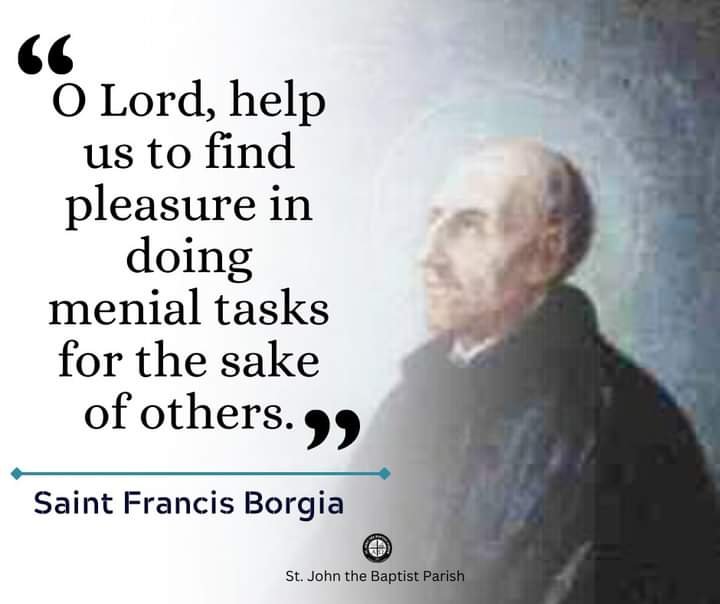
PRAYER
from the Liturgical Year, 1903
O Lord Jesus Christ, the pattern and reward of true humility, we beseech Thee, that as Thou didst make blessed Francis a glorious follower of Thee in the contempt of worldly honour, so thou wouldst grant us to be partakers of the same imitation and glory. Such is the prayer the Church offers through thee to her divine Spouse. She knows that the Saints always have great power with God; but especially when they would obtain for their devout clients the virtues they themselves more particularly cultivated when on earth.
How precious is this prerogative in thy case, O Francis, for it concerns the virtue which attracts God’s grace in this life, and wins such glory hereafter! Since pride has hurled Lucifer into the abyss, and the self-abasement of the Son of God has led to His exaltation above the heavens,–humility, whatever men may now say, has lost nothing of its inestimable value; it is still the indispensable foundation of every durable edifice, whether spiritual or social; the basis, without which the other virtues, and even charity the Queen of them all, could not subsist a single day.
